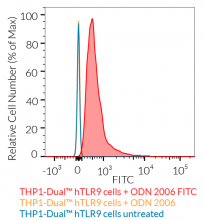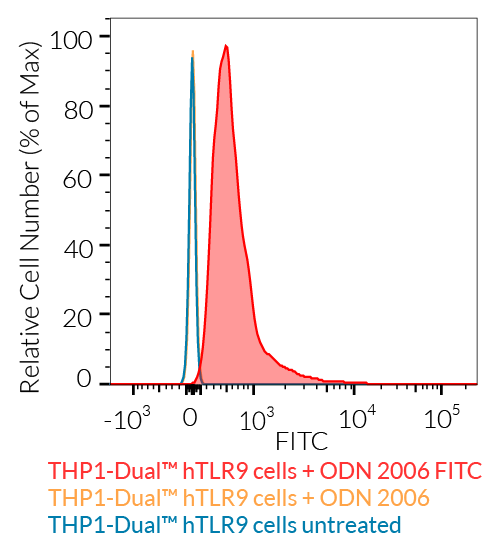ODN 2006 FITC
| Product | Unit size | Cat. code | Docs. | Price | |
|---|---|---|---|---|---|
|
ODN 2006 FITC Class B - FITC-labeled ODN 2006 |
Show product |
50 µg |
tlrl-2006f
|
FITC labeled Class B CpG oligonucleotide - Human TLR9-preferred ligand
 InvivoGen also offers:
InvivoGen also offers:
• TLR reporter cells: HEK293, RAW, THP-1 cells
• TLR research tools: Antibodies, Inhibitors, etc.
ODN 2006 FITC is a labeled version of the ODN 2006 (ODN 7909), a Class B CpG oligonucleotide (ODN). ODN 2006 is a short synthetic single-stranded DNA molecule containing unmethylated CpG dinucleotides (CpG motifs). These unmethylated CpG motifs mimic microbial DNA and act as immunostimulants. ODN 2006 is a ligand of choice for human Toll-like receptor 9 (TLR9).
Mode of action:
Stimulatory CpG ODNs are internalized and activate the endosomal receptor TLR9. Activation of TLR9 triggers NF-κB- and interferon regulatory factor (IRF)-mediated pro-inflammatory responses upon the recognition of unmethylated cytosine-phosphorothioate-guanosine (CpG) forms of DNA [1-3]. Unmethylated CpG dinucleotides are a hallmark of microbial (bacterial, viral, fungal, and parasite) DNA and mitochondrial self-DNA [3, 4]. Class B (Type K) CpG ODNs, such as ODN 2006, contain a full phosphorothioate backbone with one or more CpG dinucleotides. They strongly activate B cells but weakly stimulate IFN-α secretion in plasmacytoid dendritic cells [5].
InvivoGen's ODN 2006 FITC is the labeled version of the ODN 2006, a strong TLR9 agonist verified using our HEK-Blue™ reporter cell lines expressing human or mouse TLR9. ODN 2006 activates the hTLR9-dependent NF-κB and IRF pathways, as assessed using our THP1-Dual™ hTLR9 reporter cell line expressing two reporter genes, for the NF-κB-inducible SEAP and IRF-inducible Lucia luciferase, as well as hTLR9.
ODN 2006 FITC can be used to evaluate CpG ODN binding, cellular uptake, and localization by confocal laser-scanning microscopy (excitation 495 nm, emission 520 nm) (data not shown) or flow cytometry(see figure). The labeled ODN retains the biological activity.
Key features of ODN 2006 FITC:
- Potent activator of human TLR9
- FITC labeled
- Synthetic ODN with unmethylated CpG motifs
- Each lot is functionally tested
![]() Get more information about CpG ODNs Classes.
Get more information about CpG ODNs Classes.
![]() Read our review on TLR9 agonists: double-edged sword for immune therapies.
Read our review on TLR9 agonists: double-edged sword for immune therapies.
References
1. Kumagai Y. et al., 2008. TLR9 as a key receptor of the recognition of DNA. Adv. Drug. Deliv. Rev. 60(7):795-804.
2. Heinz L.X. et al., 2021. TASL is the SLC15A4-associated adaptor for IRF5 activation by TLR7-9. Nature. 581(7808):316-322.
3. Kayraklioglu N. et al., 2021. CpG oligonucleotides as vaccine adjuvants. DNA Vaccines: Methods and Protocols. Methods in Molecular Biology. Vol. 2197. p51-77.
4. Kumar V., 2021. The trinity of cGAS, TLR9, and ALRs: guardians of the cellular galaxy against host-derived self-DNA. Front. Immunol. 11:624597.
5. Krieg A.M. et al., 1995. CpG motifs in bacterial DNA trigger direct B-cell activation. Nature. 374(6522):546-9.
Specifications
Synonyms: ODN 7909, PF_3512676
Specificity: human TLR9 agonist
Working concentration: 1 - 5 μM
ODN 2006 sequence: 5’- tcgtcgttttgtcgttttgtcgtt -3’ (24 mer)
Note: Bases are phosphorothioate (nuclease resistant).
Spectral Properties of FITC:
- Excitation λ max: 495 nm
- Emission λ max: 520 nm
Quality control:
- ODN 2006 FITC has been validated by flow cytometry and cellular assays.
- The absence of bacterial contamination (e.g. lipoproteins and endotoxins) has been confirmed using HEK-Blue™ TLR2 and HEK-Blue™ TLR4 cells.
Contents
- 50 μg (6.2 nmol) lyophilized ODN 2006 labeled with FITC at the 3’ terminus
- 1 ml sterile endotoxin-free water
![]() FITC ODN 2006 is shipped at room temperature
FITC ODN 2006 is shipped at room temperature
![]() Stored at -20°C. Protect from light. Resuspended product should be stored at -20°C and protected from light.
Stored at -20°C. Protect from light. Resuspended product should be stored at -20°C and protected from light.
![]() Product is stable for 6 months.
Product is stable for 6 months.
![]() Avoid repeated cycles of freeze-thaw.
Avoid repeated cycles of freeze-thaw.
Details
Toll-Like Receptor 9 (TLR9) is an endosomal receptor that triggers NF-κB- and interferon regulatory factor (IRF)-mediated pro-inflammatory responses upon the recognition of unmethylated cytosine-phosphorothioate-guanosine (CpG) forms of DNA [1-3]. Unmethylated CpG dinucleotides are a hallmark of microbial (bacterial, viral, fungal, and parasite) DNA, as well as mitochondrial self-DNA [3,4]. These TLR9 agonists can be mimicked by synthetic oligonucleotides containing CpG motifs (CpG ODNs), which have been extensively studied to improve adaptive immune responses in the context of vaccination [1,3].
TLR9 is mainly expressed in subsets of Dendritic Cells and in B cells of all mammals. In rodents, but not in humans, TLR9 is also expressed in monocytes and macrophages [3]. The structure of the receptor varies by 24% between human TLR9 (hTLR9) and mouse TLR9 (mTLR9) [3]. They recognize different CpG motifs, the optimal sequences being GTCGTT and GACGTT for hTLR9 and mTLR9, respectively [5].
![]() Get more information about CpG-ODNs Classes.
Get more information about CpG-ODNs Classes.
References
1. Kumagai Y. et al., 2008. TLR9 as a key receptor of the recognition of DNA. Adv. Drug. Deliv. Rev. 60(7):795-804.
2. Heinz L.X. et al., 2021. TASL is the SLC15A4-associated adaptor for IRF5 activation by TLR7-9. Nature. 581(7808):316-322.
3. Kayraklioglu N. et al., 2021. CpG oligonucleotides as vaccine adjuvants. DNA Vaccines: Methods and Protocols. Methods in Molecular Biology. Vol. 2197. p51-77.
4. Kumar V., 2021. The trinity of cGAS, TLR9, and ALRs: guardians of the cellular galaxy against host-derived self-DNA. Front. Immunol. 11:624597.
5. Bauer S. et al., 2001. Human TLR9 confers responsiveness to bacterial DNA via species-specific CpG motif recognition. Proc Natl Acad Sci USA, 98(16):9237-42.







